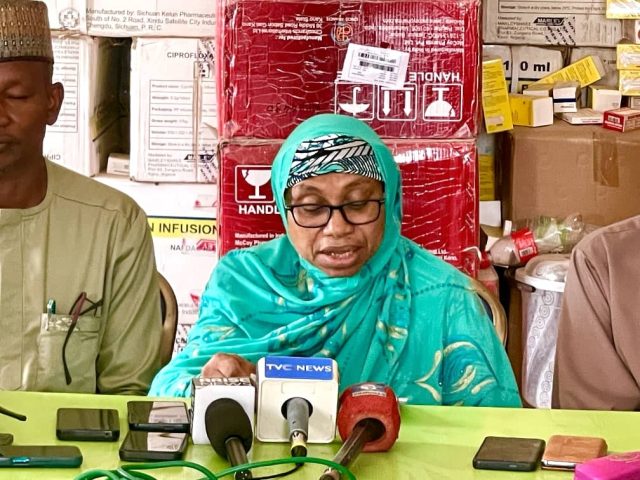A special private taskforce has confiscated unwholesome pharmaceutical products worth N1.3 billion at Kano Pharmaceutical Coordinated Wholesale Centre (KPP-CWC), at Dangwauro village, Kano.
The major breakthrough in the fight against fake and substandard pharmaceutical products was recorded in less than one year after the closure of Sabon Gari open drug market.
Briefing journalists on Thursday, Chief Superintendent Pharmacist with the centre, Hajiya Furera Ado Muhammed, said the seizure followed a series of quality control mechanisms and regulatory checks introduced after the relocation to the new coordinated wholesale centre.
She said the regulator declared the products substandard after analyses conducted shows almost 40.3% of pharmaceutical products sampled failed the laboratory test.
According to her, the centre has become a game changer enabling proper control of influx drugs and acceptance of quality medicines into Kano, adding that the intervention has saved innocent lives.
She said since establishment regulatory authorities such as the Pharmacy Council of Nigeria (PCN) and the National Agency for Food and Drug Administration and Control (NAFDAC) have maintained strong oversight of the centre’s operations.
Besides the seizure, Hajiya Mohammed said the centre recorded tremendous achievements especially on preservation of pharmaceuticals that meet global standards.
“Our activities are now subject to real-time supervision by regulatory officers. Officials have the ability to check practices at will, thanks to the centralized structure of the centre.”
”One of the centre’s most notable innovations is the acquisition of a WHO-certified cold room from the United States, powered by 24-hour solar energy, ensuring the safe storage of thermolabile pharmaceuticals, including vaccines.
“The facility maintains temperatures between +2°C to +8°C and can be adjusted below freezing when needed. Also, random sampling of drugs for Active Ingredient Content (AIC) tests has revealed disturbing trends.
The Kano centre was established under the Federal Ministry of Health’s Coordinated Wholesale Centre, a concept initiated by Prof. Muhammad Ali Pate, now Coordinating Minister of Health and Social Welfare.
The concept was designed to sanitise Nigeria’s chaotic drug distribution system, especially in states notorious for open drug markets.
Though four states—Kano, Lagos, Anambra, and Abia—were selected for the pilot phase, only Kano has successfully implemented the project.







